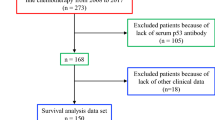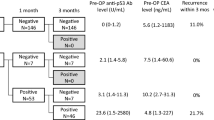Abstract
Background
The prognostic significance of anti-53 autoantibody in colorectal cancer (CRC) patients is unclear due to measurement of overall rather than disease-specific survival and generally short follow-up periods in many studies. We aim to investigate prognostic significance of anti-p53 auto-antibodies in a study with long-term follow-up (minimum 5 years).
Methods
ELISA for anti-p53 autoantibody was assayed in serum from 92 patients with CRC and 28 controls.
Results
Anti-p53 autoantibody was found in 20 patients (21.7%) and none of the controls. No difference in Dukes’ (A/B vs. C/D), Stage (I/II vs. III/IV), T1/2 vs. T3/4, N0 vs. N1/2, M0 vs. M1, poor vs. well/moderate differentiation and proximal vs. distal CRC was observed. Median overall survival was 62 months and median disease-specific survival was 73 months. Dukes’ C/D, Stage III/IV, N1/2 and M1 were associated with poor disease-specific survival in univariate analysis. Stage III/IV was an independent prognostic factor in overall and disease-free survival in multivariate analysis. Anti-p53 autoantibody sero-positivity did not influence overall (p = 0.980) or disease-specific survival (p = 0.874). Median overall survival in anti-p53 autoantibody positive patients was 62 months vs. 60 months in anti-53 autoantibody negative patients. Median disease-specific survival in anti-p53 autoantibody positive patients was 73 months vs. 82 months.
Conclusion
Anti-p53 autoantibody is not related to clinical parameters of CRC and has no prognostic significance in long-term follow-up.


Similar content being viewed by others
References
Crawford LV, Pim DC, Bulbrook RD (1982) Detection of antibodies against the cellular protein p53 in sera from patients with breast cancer. Int J Cancer 30:403–408
Soussi T (2000) p53 Antibodies in the sera of patients with various types of cancer: a review. Cancer Res 60:1777–1788
Tang R, Ko MC, Wang JY, Changchien CR, Chen HH, Chen JS, Hsu KC, Chiang JM, Hsieh LL (2001) Humoral response to p53 in human colorectal tumors: a prospective study of 1,209 patients. Int J Cancer 94:859–863
Kressner U, Inganas M, Byding S, Blikstad I, Pahlman L, Glimelius B, Lindmark G (1997) Prognostic value of p53 genetic changes in colorectal cancer. J Clin Oncol 17:593–599
Soong R, Powell B, Elsaleh H, Gnanasampanthan G, Smith DR, Goh HS, Joseph D, Iacopetta B (2000) Prognostic significance of TP53 gene mutation in 995 cases of colorectal carcinoma. Influence of tumour site, stage, adjuvant chemotherapy and type of mutation. Eur J Cancer 36:2053–2060
Houbiers JG, van der Burg SH, van de Watering LM, Tollenaar RA, Brand A, van de Velde CJ, Melief CJ (1995) Antibodies against p53 are associated with poor prognosis of colorectal cancer. Br J Cancer 72:637–641
Kressner U, Glimelius B, Bergstrom R, Pahlman L, Larsson A, Lindmark G (1998) Increased serum p53 antibody levels indicate poor prognosis in patients with colorectal cancer. Br J Cancer 77:1848–1851
Shiota G, Ishida M, Noguchi N, Oyama K, Takano Y, Okubo M, Katayama S, Tomie Y, Harada K, Hori K, Ashida K, Kishimoto Y, Hosoda A, Suou T, Kanbe T, Tanaka K, Nosaka K, Tanida O, Kojo H, Miura K, Ito H, Kaibara N, Kawasaki H (2000) Circulating p53 antibody in patients with colorectal cancer: relation to clinicopathologic features and survival. Dig Dis Sci 45:122–128
Angelopoulou K, Diamandis EP, Sutherland DJ, Kellen JA, Bunting PS (1994) Prevalence of serum antibodies against the p53 tumor suppressor gene protein in various cancers. Int J Cancer 58:480–487
Angelopoulou K, Stratis M, Diamandis EP (1997) Humoral immune response against p53 protein in patients with colorectal carcinoma. Int J Cancer 70:46–51
Takeda A, Shimada H, Nakajima K, Yoshimura S, Suzuki T, Asano T, Ochiai T, Isono K (2001) Serum p53 antibody as a useful marker for monitoring of treatment of superficial colorectal adenocarcinoma after endoscopic resection. Int J Clin Oncol 6:45–49
Shibata Y, Kotanagi H, Andoh H, Koyama K, Itoh H, Kudo S (1996) Detection of circulating anti-p53 antibodies in patients with colorectal carcinoma and the antibody’s relation to clinical factors. Dis Colon Rectum 39:1269–1274
Bielicki D, Karbowniczek M, Sulzyc-Bielicka V, Kladny J, Boer C, Marlicz K, Domagala W (1999) Clinico-pathological characteristics of colorectal cancer and serum anti-p53 antibodies. Pol J Pathol 50:77–81
Chang SC, Lin JK, Lin TC, Liang WY (2005) Genetic alteration of p53, but not overexpression of intratumoral p53 protein, or serum p53 antibody is a prognostic factor in sporadic colorectal adenocarcinoma. Int J Oncol 26:65–75
Lechpammer M, Lukac J, Lechpammer S, Kovacevic D, Loda M, Kusic Z (2004) Humoral immune response to p53 correlates with clinical course in colorectal cancer patients during adjuvant chemotherapy. Int J Colorectal Dis 19:114–120
Broll R, Duchrow M, Oevermann E, Wellm C, Schwandner O, Schimmelpenning H, Roblick UJ, Bruch HP, Windhovel U (2001) p53 autoantibodies in sera of patients with a colorectal cancer and their association to p53 protein concentration and p53 immunohistochemistry in tumor tissue. Int J Colorectal Dis 16:22–27
Shimada H, Ochiai T, Nomura F (2003) Titration of serum p53 antibodies in 1,085 patients with various types of malignant tumors: a multiinstitutional analysis by the Japan p53 Antibody Research Group. Cancer 97:682–689
Hammel P, Boissier B, Chaumette MT, Piedbois P, Rotman N, Kouyoumdjian JC, Lubin R, Delchier JC, Soussi T (1997) Detection and monitoring of serum p53 antibodies in patients with colorectal cancer. Gut 40:356–361
Acknowledgment
The authors would like to thank Rachel Waddington-Clark, ANR Statistical Consultants, for her aid in statistical analysis
Author information
Authors and Affiliations
Corresponding author
Rights and permissions
About this article
Cite this article
Suppiah, A., Alabi, A., Madden, L. et al. Anti-p53 autoantibody in colorectal cancer: prognostic significance in long-term follow-up. Int J Colorectal Dis 23, 595–600 (2008). https://doi.org/10.1007/s00384-008-0458-4
Accepted:
Published:
Issue Date:
DOI: https://doi.org/10.1007/s00384-008-0458-4




